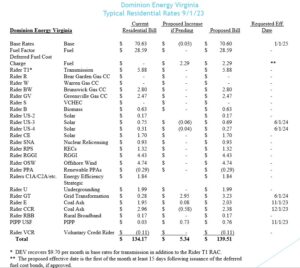
by Steve Haner
When the Virginia General Assembly passed a complicated electricity regulation change a few months ago, the Richmond Times-Dispatch parroted as fact this Dominion Energy Virginia claim in a front-page paragraph:
The compromise on electric bills — in legislation that passed nearly unanimously — would bring an immediate $6 to $7 cut in a benchmark 1,000 kilowatt-hour monthly bill, which now stands at $137.
Bacon’s Rebellionpromised to check on that
. Did that benchmark bill drop “immediately” to $130 or $131? Was there an even bigger drop as others had promised, including even Governor Glenn Youngkin (R), who still claims on his website that he “delivered savings on power bills of $14 per month?”
The State Corporation Commission made a presentation to legislators last week that included the September 1 “typical” bill, broken down by individual elements. The table reported a total cost for 1,000 kilowatt hours as $134.17. That is three dollars lower than the cost cited in the Times-Dispatch article above.
But to believe even that is a “reduction” you have to be gullible enough to fall for the game Dominion and the legislature played with the unpaid fuel debt from prior years. The difference is entirely because the utility convinced the SCC to let it suspend collection of that unpaid debt, dropping the bill temporarily about $7. The company has an application pending to convert that to a long-term bond that will actually cost customers more over time.
Lots of voters will fall for this, no question.
The SCC’s table on the current rates was broken down in detail, and shows how the bill should reach close to $140 soon. About a year ago, the SCC produced a similar detailed table. It reported the cost as $136.93 as of July 1, 2022. Adding in the additions and subtractions it was projecting for Sept 1, 2022, a bill of $139.77 was expected. That was $5.60 higher than the actual bill the SCC reported for this month.
Again, comparing the tables it is evident the biggest cost decrease happened in the line for fuel payments, down to $28.59 now from the previous year’s $35.38. Had Dominion not elected (or the SCC not agreed) to suspend much of that for the short term, the bill would actually have been higher than last year. And eventually you will still pay that, just not before the November election.
The SCC also reported on the September 1, 2023 rates for Appalachian Power Company, Virginia’s second largest utility. Note the $43.19 per month its customers are paying for current and past fuel use. That’s about what Dominion customers should be paying now under traditional utility ratemaking.
Comparing the two Dominion tables gives you some grasp of the complexity of Virginia’s unique regulatory structure. Dominion in particular is fond of “rate adjustment clauses” for individual power stations or individual programs, such as coal ash disposal or purchasing renewable energy certificates. You see far fewer of those “RAC’s” on the APCO bill.
Each rate adjustment clause is reviewed and adjusted every year or so, sometimes going up and sometimes down. Looking at the tables you can also see that three major ones have been discontinued, for three fossil fuel power plants. That change is the other part of the claimed “bill relief” from the 2023 legislation and all things being equal might count as good news.
But all things are not equal. As those charges disappeared, the monthly charge to collect the Regional Greenhouse Gas Initiative carbon tax returned to bills. Your monthly contribution to the coming offshore wind project grew substantially. The transmission costs collected in what is called Rider T are also higher than a year before.
The accounting impact of the three rate adjustment clauses that were folded into base rates is still being analyzed at the SCC. The news might be less good than on first blush. It might just be another game of hide the pea. If making that change prevented a finding that the base rates were excessive and prevented a future reduction in base rates, was that really “bill relief”?
The utility and the legislature giveth and they taketh away. Mostly they taketh away. The net impact of multiple legislation in this arena since 2018 has been to increase costs, greatly. But the bills known to cause higher prices never get the attention and media praise that was given to the 2023 bill, which was designed to create the election-year illusion of “bill relief.”
Your bill has not gone down at all, and really has gone up if you include the deferred (but not forgiven) fuel debt. If the campaign mailings about “energy savings” that showed up in the primary season start to appear again, be skeptical.

Leave a Reply
You must be logged in to post a comment.